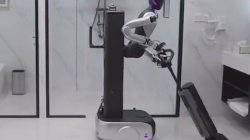A pioneering new study conducted jointly by the International Labour Organization (ILO) and Poland’s National Research Institute (NASK) indicates that approximately 25% of all global jobs could be impacted by the disruptive potential of generative artificial intelligence (GenAI). However, the findings offer some comfort to employees as they suggest that these technologies will lead to transformation rather than outright job displacement.
Introduced on May 20th, the research titled “Generative AI and Jobs: A Detailed Worldwide Index of Job Exposure” offers an analysis described by its creators as the most intricate current overview of how generative artificial intelligence might transform employment globally. This index combines expert evaluation with AI-enhanced scoring techniques using a comprehensive dataset comprising almost 30,000 distinct workplace activities. It sets a new benchmark for gauging worker vulnerability to advancements in AI technology.
We moved past just theoretical concepts to create a tool based on actual job experiences,” said Pawel Gmyrek, an ILO Senior Researcher and the principal author of the report. “Through integrating human expertise, professional evaluations, and advanced AI models, we’ve developed a repeatable approach that enables nations to evaluate risks more effectively and address them precisely.
Tolong support kita ya,
Cukup klik ini aja: https://indonesiacrowd.com/support-bonus/
The research indicated that globally, around 25% of all jobs could be affected by General Artificial Intelligence advancements, with this percentage increasing to 34% in wealthier nations. One of the most notable findings was the disparity between genders: in these higher-income regions, almost 10% of employed women face significant risks from job automation, whereas only about 3.5% of men do. The study emphasizes that this considerable difference necessitates immediate consideration and action from policymakers.
White-collar jobs like those held by administrative assistants and data entry clerks have been identified as the most at risk. Such positions typically involve routine mental activities and are therefore more likely to be impacted by advancements in General Artificial Intelligence (GenAI) technology. However, the study also pointed out an increasing vulnerability within heavily digital fields including journalism, programming, and banking. As GenAI continues to advance, it is beginning to affect areas previously thought secure because of their reliance on complex cognitive skills.
Despite this, the report takes care to distinguish between possibility and actuality. The complete automation of jobs still has boundaries. As the study points out, “Although many tasks are performed more efficiently, they still necessitate human intervention.” It highlights differing impacts: whereas software developers might adjust and thrive alongside technological advancements, those with minimal digital proficiency could find it challenging to stay current.
The index aids in pinpointing areas where Generative Artificial Intelligence is poised to make significant impacts, enabling nations to enhance their preparations and safeguard workers,” stated Marek Troszynski, a Senior Expert at NASK and one of the report’s authors. He highlighted that the tool will subsequently be utilized for labor force statistics from Poland, aiming to improve specific national policy measures.
The ILO–NASK report emphasizes that variations in technological infrastructure, government policies, and worker competencies will shape how the impacts of Generative Artificial Intelligence manifest at the local level. It should be noted, as the authors highlight, these statistics indicate possible exposure rather than definitive job reductions. A lot hinges on the actions taken by different nations.
This instrument assists nations worldwide in evaluating possible impacts and readying their labor markets for a more equitable digital future,” stated Janine Berg, Senior Economist at the ILO. “It’s simple to lose oneself in the AI buzz. Instead, what we require is clear understanding and proper perspective.
In conclusion, this research serves as an urgent appeal for all stakeholders. It encourages governments, businesses, and labor unions to participate in open discussions and implement measures ensuring that technological advancements improve, not degrade, employment conditions.
As stated in the ILO newsletter, this groundbreaking report marks the initial volume in a series of collaborative publications between the ILO and NASK focusing on Generative Artificial Intelligence (GenAI) and its implications for the future of work. Future installments will explore labor-related effects at a national level and provide practical recommendations for formulating fair policies during the AI era—particularly within developing and emerging economies, which face significant challenges in this domain.
ALSO SEE: ILO calls for gender-sensitive social protection systems to address ongoing inequality disparities
Provided by Syndigate Media Inc. (
Syndigate.info
).





